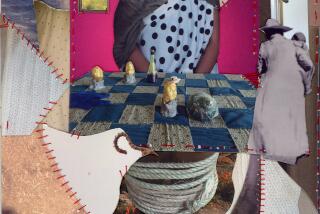Bin Laden Uses Dreams and Visions as All-Powerful Tools
- Share via
Much about Osama bin Laden and his followers can be fairly described as nightmarish.
But until Thursday’s release of a videotape documenting the terrorist kingpin’s post-Sept. 11 courtesy call with a visiting Saudi sheik, few in the West would have guessed that within Al Qaeda, the recitation of dreams and visions had become what one Islamic specialist called “a powerful tool of conspiracy and psychological seduction.”
Scholars, however, are unsurprised. Although dreams are not accorded an exaggerated authority in Muslim scripture, they are a powerful current within Islamic folk religion, they say.
Over and over on a 39-minute portion of the videotape, Bin Laden and his followers refer matter-of-factly to prophetic dreams and visions among numerous members of their circle anticipating the attacks on New York and the Pentagon.
At one point before Sept. 11, Bin Laden said on the tape, such dreams became so widespread among his followers in Afghanistan that he began to consider them a security risk. “I was worried that maybe the secret would be revealed, if everyone starts seeing it in their dreams,” he is recorded as saying.
Dreams are sprinkled throughout the scriptures of all three Abrahamic faiths, from the grand dreams of Joseph, son of Jacob, in the Hebrew scriptures to the apostle John’s apocalyptic revelation that closes the Christian canon.
“Since Islamic believers consider themselves to be ‘people of the book’ along with Jews and Christians, it is worth recalling that probably two-thirds of the Hebraic and Christian scriptures involve dreams and visions,” said Maria Jaoudi, professor of religious studies at Cal State Sacramento and author of “Christian Mysticism East and West.”
“All the major religions do honor dreams,” said Jungian psychologist Victoria Dendinger, who teaches dream workshops at the Center for Spiritual Development in Orange.
According to Sulayman Nyang, professor of Islamic and African Studies at Howard University, the prophet Muhammad placed special emphasis on the dreams of average Muslims, saying: “A single dream that comes true for the ordinary person is 1/64th of all prophecy.”
“If you consider the impact of that statement on unschooled Muslims and then consider this tape,” Nyang said, “you can see the ambition of Bin Laden.
“For [Bin Laden], the dream is a tool to control and seduce. He is a conspirator and in his hands, the dream becomes a ruse intended to elevate him spiritually in the eyes of those outside his conspiracy. He knows what is going to happen, but by inventing a dream predicting the very act he is conspiring to commit, he has not only constructed a self-fulfilling prophecy, but one that is calculated to make him appear as the favorite of God.
“These are powerful associations in the minds of unsophisticated and unschooled Muslims,” Nyang said.
On the tape, the swapping of bloody-minded reveries begins with the visiting sheik, who recounted “a vision by Sheik Salih Al-Shuaybi” in which that Arab cleric foresaw “a great hit and people will go out by hundreds to Afghanistan. . . . He had this vision a year ago.”
Bin Laden recalled that last year one of his followers had told him: “I saw in a dream, we were playing a soccer game against the Americans. When our team showed up in the field, they were all pilots.”
An unidentified man heard off-camera recalled a comrade’s pre-Sept. 11 vision in which “a plane crashed into a tall building. He knew nothing about” the terrorist plans. And so it went, including the recollection of further visions of “jihad . . . in Washington and New York” and, even the dream of one man’s wife, who “saw the plane crashing into a building.”
Richard Hrair Dekmejian, a USC professor who specializes in the study of Islamic fundamentalism, said much of the dream talk by Bin Laden’s associates seemed fictional.
“They were trying to kiss up to him and share the moment of glory--touch the halo,” Dekmejian said. “Some of it was manufactured on the spot.”
The professor said that a pious, mainstream Muslim would not pay much attention to dreams for their religious value. But the interpretation of dreams is a popular pastime within Islamic cultures, especially as predictors of the future.
“It’s a part of Islamic superstition--it’s more a folk belief,” he said.
In either event, Dekmejian said, dreams never are called prophecies by orthodox Muslims, since their faith tradition holds that Muhammad is the final prophet.
“On the tape, they’re careful to say they were dreams,” he said. “If they put themselves in the same positions as prophets, they’ll be in danger of being called apostates.”
Suspicion of so-called prophetic dreams, said Muzammil Siddiqi, a former president of the Islamic Society of North America, has a practical foundation: They can be exaggerated or simply made up after the fact.
In Islamic culture, “people like to tell about their dreams,” Siddiqi said. “Sometimes, of course, you can’t know if what they are telling is true or false. You need to be very careful when you relate a dream to others.”
But Jaoudi, a scholar of mystical experience, suggested a workaday explanation for Al Qaeda’s lack of such caution. “What I find fascinating here is the possibility that what is being reported is a kind of collective dream, which from a psychological point of view makes you wonder what might be going on among Bin Laden and his followers,” she said. “Suggestibility is a powerful force. There is a great deal of literature in psychology that seems to indicate that you can, in fact, direct the dreams not only of individuals, but also of groups.
More to Read
Sign up for Essential California
The most important California stories and recommendations in your inbox every morning.
You may occasionally receive promotional content from the Los Angeles Times.













